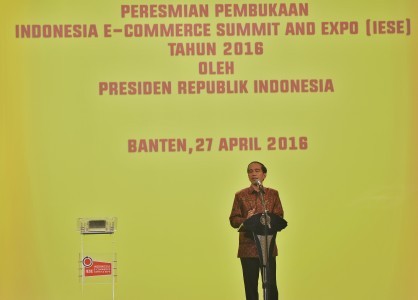Popular Reads
Top Results
Can't find what you're looking for?
View all search resultsPopular Reads
Top Results
Can't find what you're looking for?
View all search resultsE-commerce boom here to stay, industry players say
Change text size
Gift Premium Articles
to Anyone
E-commerce faced the unlikeliest mix of trends last year: The volume of transactions reached record highs, but many foreign giants, like Japan’s Rakuten and Germany’s Lamido, exited the market.
But just as worries began to emerge, with foreign investment into e-commerce dropping to US$19 million last year from $27 million in 2014, the e-commerce industry appears to be rebounding.
In the first quarter this year, foreign investment in e-commerce leaped more than fivefold to $5.2 million from $950,000 in the same period last year.
With President Joko “Jokowi” Widodo recently opening up numerous business sectors for foreign investment, including allowing 100 percent foreign ownership of e-commerce businesses, industry players are upbeat that investment in the sector will soar this year.
“Marketplaces will definitely go through a period of hardship this year and the following years, but make no mistake about it, the market is still wide open for anything that could happen,” said Daniel Tumiwa, chairman of the Indonesian E-commerce Association (idEA) and CEO of classifieds site OLX.
Besides Rakuten and Lamido – both selling consumer products –, three local tech start-ups quit the arena recently. They are clothing site Paraplou, travel booking site Valadoo and financial technology firm Inapay.
Tech start-ups advocate Rama Mamuaya argued that regulatory uncertainty was among the main factors behind last year’s drop in foreign investment in e-commerce.
“The situation is different now. We have lifted [restrictions] for foreigners in the negative investment list, so now they can own an online business wholly, and various ministries have shown good will to fix the regulations,” he added.
“The market here is still vast,” Rama said, expressing confidence that Indonesia still had lots of growth potential in e-commerce compared with other countries with more mature e-commerce markets.
The number of online shoppers in Indonesia hit 7.4 million last year, only a tiny fraction of the country’s 250 million population – something that is considered an opportunity for e-commerce players to grow their businesses.
The idEA hopes Indonesian ecommerce transactions will reach a value of $24.6 billion this year, three times the $8 billion recorded in 2013.
A lot of e-commerce businesses say they do not feel the pinch, as business is going strong with rising revenue.
Lazada Indonesia public relations manager Tania Amalia said the Singapore-based e-commerce platform kept seeing strong growth despite the lackluster overall economy, which grew at 4.79 percent last year, the slowest in six years.
Local marketplace Bukalapak CEO Achmad Zaky shared that view: “Our business is doing great.”
Neither Lazada nor Bukalapak mentioned revenue figures.
Bukalapak — which is among the mature local start-ups, along with Traveloka and Go-Jek, that dominated the sector in 2015 — expects this year to be the time for smaller start-ups to get seed funding from venture capital companies thanks to a more conducive regulatory environment.
Earlier this week, President Jokowi signed Presidential Regulation No. 44 of 2016 on the negative investment list, allowing foreign investors to own 100 percent of ecommerce businesses valued at Rp 100 billion (US$7.3 million) or more. For businesses value at less than that, foreign investors can hold up to 49 percent.
The Investment Coordinating Board’s (BKPM) director for business development, Pratito Soeharyo, said that since October last year, any company, including e-commerce businesses worth Rp 100 billion or more could be established in just three hours under the so-called three-hour licensing facility.
The Communication and Information Technology Ministry has handed the President an e-commerce road map to sign, which comprises guidelines on start-up funding, logistics, consumer protection, communications infrastructure, tax revision, human resource development and cyber security.
These regulatory changes are expected to serve as a strong foundation for the e-commerce industry to flourish further, backed by the expectation that the number of internet users in Indonesia will reach 112 million by 2017 and 280 million by 2030, up from 93.4 million in 2015, according to data from the Association of Internet Providers (APJIII).
 .(./JP)
.(./JP)










